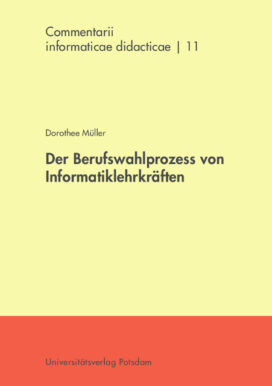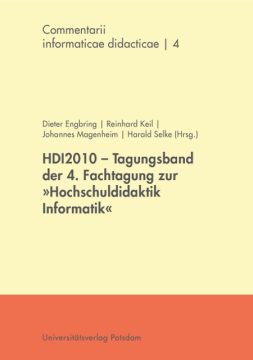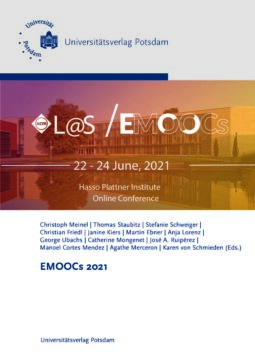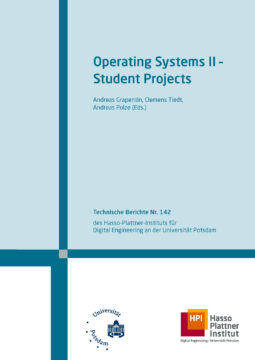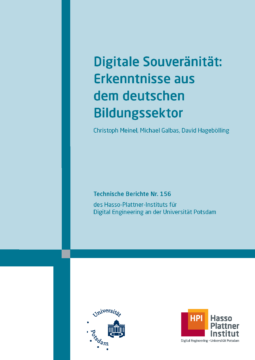For years, the shortage of computer science teachers has been a known issue discussed among specialists in the field and policy-makers alike. Due to the low number of students seeking licensure as computer science teachers, one can expect this shortage to become further exacerbated. This raises the question: why do so few students choose to major in the teaching of computer science?
The aim of this work is to research how and why current computer science teachers chose this profession by considering their individual backgrounds and identifying factors which had a positive or negative effect on their choice of a career. The research focuses on the qualitative empirical study of the career choice process, while a quantitative survey of active computer science teachers provides more in-depth information into the process that leads to choosing this career. The qualitative study has a research concept based on grounded theory. Prospective computer science teachers were interviewed regarding their career choice process, with data collected using interviews, group discussions, and written biographical statements concerning their career choice process. The data analysis uses the documentary method developed by Ralf Bohnsack.
The results show that prospective computer science teachers frequently came upon this career choice through a circuitous route involving detours and changes in major. In addition to their image of computer science as a discipline and the role they envisioned themselves playing in it, their experiences of computer science instruction from their own years in school play an important role in the process. Research into the career motivations of teachers has shown that it was teachers and their experiences of instruction that were decisive to prospective teachers’ decision to enter the field at university. This is confirmed in the biographical statements written by this study’s participants, where they reported positive memories of computer science classes during their own years at school. It is these who tend to enrol in computer science education programmes as their first degree choice. While in school, they had a positive image of computer science as a discipline and the role they envisioned themselves playing in it. They frequently consider their computer science teachers as professional role models. However, most of the prospective computer science teachers surveyed either had no computer science classes in school or had negative memories of them. These respondents’ decisions to train as computer science teachers often came after detours pursuing other degrees, mostly from a teaching degree in other subjects or a computer science degree. Those who came to university intending to major in computer science usually had a positive image of computer science and their potential role in the field, but lacked any positive image of computer science teaching as a career option. Their decision to change from a pure computer science degree to one in computer science education is usually triggered by the desire for a greater social commitment in their future careers. Among student teachers who often initially have a negative image of computer science and/or their potential role in that field, their decision to switch over to the computer science education programme often comes from positive experiences in coursework with some IT component. For those switching their majors, the final decision to pursue a career in computer science education is often correctly perceived as having been driven by coincidence.
ISBN: 978-3-86956-392-3
313 pages
Release year 2017
Series: Commentarii informaticae didacticae (CID) , 11
13,50 €
Non-taxable transaction according to § 1 (1) UStG/VAT Act in combination with § 2 (3) UStG/VAT Act a. F. Providing this service, the University of Potsdam does not constitute a Betrieb gewerblicher Art/Commercial Institution according to § 1 (1) No. 6 or § 4 KStG/Corporate Tax Act. If the legal characterization of our business is changed to a commercial institution subsequently, we reserve the right to invoice VAT additionally. zzgl. Versandkosten
For years, the shortage of computer science teachers has been a known issue discussed among specialists in the field and policy-makers alike. Due to the low number of students seeking licensure as computer science teachers, one can expect this shortage to become further exacerbated. This raises the question: why do so few students choose to major in the teaching of computer science?
The aim of this work is to research how and why current computer science teachers chose this profession by considering their individual backgrounds and identifying factors which had a positive or negative effect on their choice of a career. The research focuses on the qualitative empirical study of the career choice process, while a quantitative survey of active computer science teachers provides more in-depth information into the process that leads to choosing this career. The qualitative study has a research concept based on grounded theory. Prospective computer science teachers were interviewed regarding their career choice process, with data collected using interviews, group discussions, and written biographical statements concerning their career choice process. The data analysis uses the documentary method developed by Ralf Bohnsack.
The results show that prospective computer science teachers frequently came upon this career choice through a circuitous route involving detours and changes in major. In addition to their image of computer science as a discipline and the role they envisioned themselves playing in it, their experiences of computer science instruction from their own years in school play an important role in the process. Research into the career motivations of teachers has shown that it was teachers and their experiences of instruction that were decisive to prospective teachers’ decision to enter the field at university. This is confirmed in the biographical statements written by this study’s participants, where they reported positive memories of computer science classes during their own years at school. It is these who tend to enrol in computer science education programmes as their first degree choice. While in school, they had a positive image of computer science as a discipline and the role they envisioned themselves playing in it. They frequently consider their computer science teachers as professional role models. However, most of the prospective computer science teachers surveyed either had no computer science classes in school or had negative memories of them. These respondents’ decisions to train as computer science teachers often came after detours pursuing other degrees, mostly from a teaching degree in other subjects or a computer science degree. Those who came to university intending to major in computer science usually had a positive image of computer science and their potential role in the field, but lacked any positive image of computer science teaching as a career option. Their decision to change from a pure computer science degree to one in computer science education is usually triggered by the desire for a greater social commitment in their future careers. Among student teachers who often initially have a negative image of computer science and/or their potential role in that field, their decision to switch over to the computer science education programme often comes from positive experiences in coursework with some IT component. For those switching their majors, the final decision to pursue a career in computer science education is often correctly perceived as having been driven by coincidence.
Recommended Books
-
 2011
2011Reinhard Keil, Johannes Magenheim, Harald Selke, Dieter Engbring
HDI2010 – Tagungsband der 4. Fachtagung zur “Hochschuldidaktik Informatik”
10,00 €Non-taxable transaction according to § 1 (1) UStG/VAT Act in combination with § 2 (3) UStG/VAT Act a. F. Providing this service, the University of Potsdam does not constitute a Betrieb gewerblicher Art/Commercial Institution according to § 1 (1) No. 6 or § 4 KStG/Corporate Tax Act. If the legal characterization of our business is changed to a commercial institution subsequently, we reserve the right to invoice VAT additionally.
zzgl. Versandkosten
Add to cart -
 2021
2021Giora Alexandron, Laura Allegue, Diana Andone, Valeria Baudo, Elaine Beirne, Mike Bernd, Joseph Bethge, Virginia Katherine Blackwell, Max Bothe, Federica Brambilla, Mark Brown, Ilona Buchem, Jaime Busquets, May Kristine Jonson Carlon, Fell Kurban Caroline, Juan Pablo Carvallo, Daniela Casiraghi, Irene-Angelica Chounta, Paola Corti, Jeffrey S. Cross, Partha-Pratim Das, Ignacio Despujol, Martin Ebner, Marc Egloffstein, John Maurice Gayed, Halvdan Haugsbakken, Julia Hense, César Augusto Hernández Reyes, Dirk Ifenthaler, Dan Yngve Jacobsen, Julien Jacqmin, Sa’ar Karp Gershon, John Kerr, Mohammad Khalil, Johanna Koskinen, Inger Langseth, Anja Lorenz, Conchúr Mac Lochlainn, Jorge Maldonado-Mahauad, Alejandra Martínez-Monés, Christoph Meinel, Vlad Mihăescu, Ana Moura Santos, Toru Nagahama, Mairéad Nic Giolla Mhichíl, Charlotta Nilsson, Oliver Nordemann, Ebru Okatan, Alejandro Ortega-Arranz, Özdemir Paker Doğu, Shai Perach, Antonella Poce, Eva Ponce, Mohamed Rami Gaddem, Maria Rosaria Re, Tobias Rohloff, José A. Ruipérez-Valiente, Muhitin Şahin, Nicolay Samaniego-Erazo, Susanna Sancassani, Nathanael Schenk, Sandra Schön, Florian Schwerer, Cheyvuth Seng, Sebastian Serth, Sindhu Srinath, Thomas Staubitz, Maija Suonpää, Paraskevi Topali, Zelha Tunç Pekkan, Carlos Turró, Javier Valdiviezo, Mara Valente, Radu Vasiu, Sara L. Villagrá-Sobrino, Mary Ellen Wiltrout, Andreas Wittke, Tobias Wuttke
EMOOCs 2021
25,00 €Non-taxable transaction according to § 1 (1) UStG/VAT Act in combination with § 2 (3) UStG/VAT Act a. F. Providing this service, the University of Potsdam does not constitute a Betrieb gewerblicher Art/Commercial Institution according to § 1 (1) No. 6 or § 4 KStG/Corporate Tax Act. If the legal characterization of our business is changed to a commercial institution subsequently, we reserve the right to invoice VAT additionally.
zzgl. Versandkosten
Add to cart -
 2023
2023Grapentin, Andreas; Polze, Andreas; Tiedt, Clemens (Hrsg.)
Operating Systems II – Student Projects
0,00 €Non-taxable transaction according to § 1 (1) UStG/VAT Act in combination with § 2 (3) UStG/VAT Act a. F. Providing this service, the University of Potsdam does not constitute a Betrieb gewerblicher Art/Commercial Institution according to § 1 (1) No. 6 or § 4 KStG/Corporate Tax Act. If the legal characterization of our business is changed to a commercial institution subsequently, we reserve the right to invoice VAT additionally.
Add to cart -
 2023
2023Christoph Meinel, Michael Galbas, David Hagebölling
Digitale Souveränität
0,00 €Non-taxable transaction according to § 1 (1) UStG/VAT Act in combination with § 2 (3) UStG/VAT Act a. F. Providing this service, the University of Potsdam does not constitute a Betrieb gewerblicher Art/Commercial Institution according to § 1 (1) No. 6 or § 4 KStG/Corporate Tax Act. If the legal characterization of our business is changed to a commercial institution subsequently, we reserve the right to invoice VAT additionally.
Add to cart
Publisher Info
Contact
Potsdam University Library
University Press
Am Neuen Palais 10
14476 Potsdam
Germany
verlag@uni-potsdam.de
0331 977-2094
0331 977-2292

